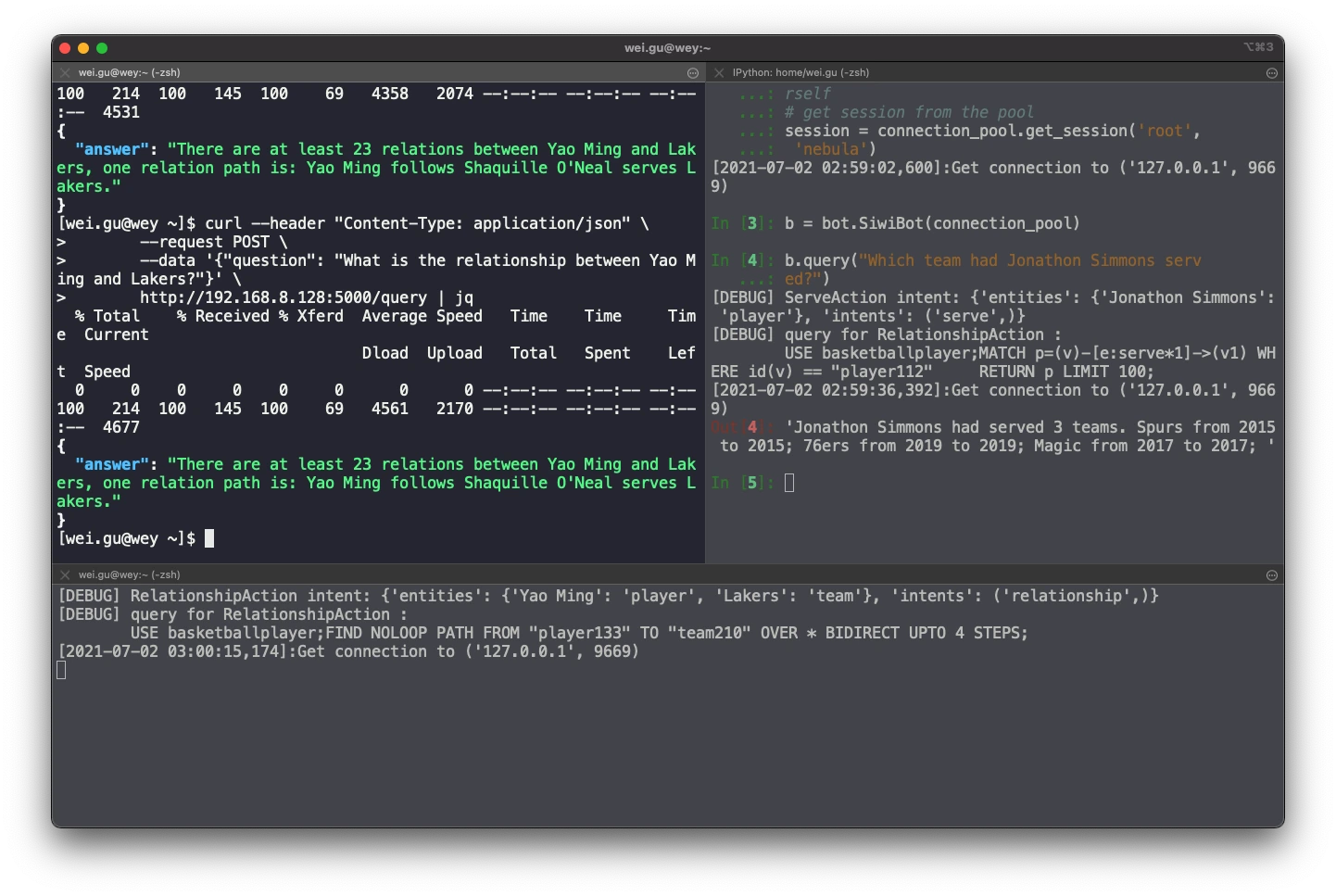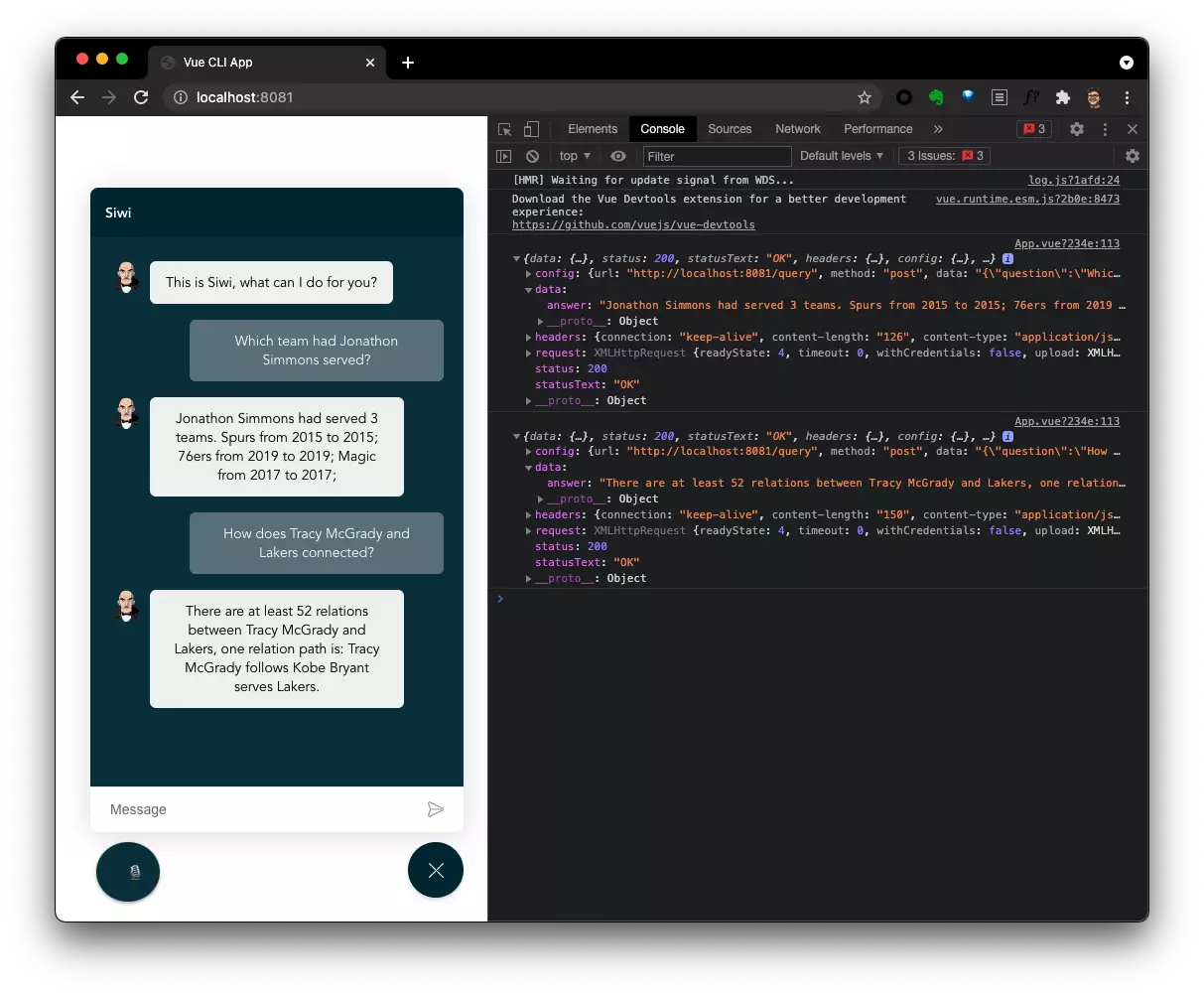Siwi (/ˈsɪwi/) é um PoC de sistema de diálogo com gráfico de conhecimento baseado em banco de dados gráfico.
Por enquanto, é uma demonstração para bots de diálogo orientados a tarefas (não de uso geral) com KG (Knowledge Graph) aproveitando o Nebula Graph com o conjunto de dados mínimo/de amostra do Nebula Graph Manual/ NG中文手册.
Dicas: Agora você pode brincar com o gráfico online sem se instalar!
Parque Nebulosa | Parque Nebulosa - China Continental
Consultas suportadas:
relation :
serving :
friendship :
Você pode tentar do zero aqui: https://siwei.io/learn/nebula-101-siwi-kgqa/
Este é um dos pipelines mais ingênuos para um bot de bate-papo de domínio específico/de propósito único construído em um Gráfico de conhecimento.

O Backend (API Siwi) é um servidor API baseado em Flask:
O servidor Flask API responde a perguntas em HTTP POST e chama a API do bot.
Na parte da API do bot, há classfier (Análise Simnética, Correspondência de Intenção, Preenchimento de Slot) e atores de perguntas (Chame ações correspondentes para consultar o Knowledge Graph com intenções e slots).
O Knowledge Graph é construído em um banco de dados gráfico de código aberto: Nebula Graph

O Frontend é um aplicativo de página única VueJS (SPA):
┌────────────────┬──────────────────────────────────────┐
│ │ │
│ │ Speech │
│ ┌──────────▼──────────┐ │
│ │ Frontend │ Siwi, /ˈsɪwi/ │
│ │ Web_Speech_API │ A PoC of │
│ │ │ Dialog System │
│ │ Vue.JS │ With Graph Database │
│ │ │ Backed Knowledge Graph │
│ └──────────┬──────────┘ │
│ │ Sentence │
│ │ │
│ ┌────────────┼──────────────────────────────┐ │
│ │ │ │ │
│ │ │ Backend │ │
│ │ ┌──────────▼──────────┐ │ │
│ │ │ Web API, Flask │ ./app/ │ │
│ │ └──────────┬──────────┘ │ │
│ │ │ Sentence ./bot/ │ │
│ │ ┌──────────▼──────────┐ │ │
│ │ │ │ │ │
│ │ │ Intent matching, │ ./bot/classifier│ │
│ │ │ Symentic Processing │ │ │
│ │ │ │ │ │
│ │ └──────────┬──────────┘ │ │
│ │ │ Intent, Entities │ │
│ │ ┌──────────▼──────────┐ │ │
│ │ │ │ │ │
│ │ │ Intent Actor │ ./bot/actions │ │
│ │ │ │ │ │
│ └─┴──────────┬──────────┴───────────────────┘ │
│ │ Graph Query │
│ ┌──────────▼──────────┐ │
│ │ │ │
│ │ Graph Database │ Nebula Graph │
│ │ │ │
│ └─────────────────────┘ │
│ │
│ │
│ │
└───────────────────────────────────────────────────────┘
.
├── README.md
├── src
│ ├── siwi # Siwi-API Backend
│ │ ├── app # Web Server, take HTTP requests and calls Bot API
│ │ └── bot # Bot API
│ │ ├── actions # Take Intent, Slots, Query Knowledge Graph here
│ │ ├── bot # Entrypoint of the Bot API
│ │ ├── classifier # Symentic Parsing, Intent Matching, Slot Filling
│ │ └── test # Example Data Source as equivalent/mocked module
│ └── siwi_frontend # Browser End
│ ├── README.md
│ ├── package.json
│ └── src
│ ├── App.vue # Listening to user and pass Questions to Siwi-API
│ └── main.js
└── wsgi.pyO backend depende do Nebula Graph, um banco de dados de gráficos distribuídos de código aberto.
Instale o Nebula Graph no oneliner:
curl -fsSL nebula-up.siwei.io/install.sh | bashCarregue o conjunto de dados do jogador de basquete.
~ /.nebula-up/console.sh
nebula-console -addr graphd -port 9669 -user root -p nebula -e " :play basketballplayer "Instale e execute.
# Install siwi backend
python3 -m build
# Configure Nebula Graph Endpoint
export NG_ENDPOINTS=127.0.0.1:9669
# Run Backend API server
gunicorn --bind :5000 wsgi --workers 1 --threads 1 --timeout 60Para OpenFunction/KNative
docker build -t weygu/siwi-api .
docker run --rm --name siwi-api
--env=PORT=5000
--env=NG_ENDPOINTS=127.0.0.1:9669
--net=host
weygu/siwi-apiExperimente a API da Web:
$ curl -s --header " Content-Type: application/json "
--request POST
--data ' {"question": "What is the relationship between Yao Ming and Lakers?"} '
http://192.168.8.128:5000/query | jq
{
" answer " : " There are at least 23 relations between Yao Ming and Lakers, one relation path is: Yao Ming follows Shaquille O'Neal serves Lakers. "
}Chame a API Bot Python:
from nebula3 . gclient . net import ConnectionPool
from nebula3 . Config import Config
# define a config
config = Config ()
config . max_connection_pool_size = 10
# init connection pool
connection_pool = ConnectionPool ()
# if the given servers are ok, return true, else return false
ok = connection_pool . init ([( '127.0.0.1' , 9669 )], config )
# import siwi bot
from siwi . bot import bot
# instantiate a bot
b = bot . SiwiBot ( connection_pool )
# make the question query
b . query ( "Which team had Jonathon Simmons served?" )Então uma resposta será assim:
In [ 4 ]: b . query (" Which team had Jonathon Simmons serv
...: ed ?")
[ DEBUG ] ServeAction intent : { 'entities' : { 'Jonathon Simmons' : 'player' }, 'intents' : ( 'serve' ,)}
[ DEBUG ] query for RelationshipAction :
USE basketballplayer ;
MATCH p = ( v ) - [ e : serve * 1 ] - > ( v1 ) WHERE id ( v ) == "player112"
RETURN p LIMIT 100 ;
[ 2021 - 07 - 02 02 : 59 : 36 , 392 ]: Get connection to ( '127.0.0.1' , 9669 )
Out [ 4 ]: 'Jonathon Simmons had served 3 teams. Spurs from 2015 to 2015; 76ers from 2019 to 2019; Magic from 2017 to 2017; 'Referindo-se a siwi_frontend
┌─────────────────────────────┐
│ kind: Ingress │ ┌───────────────────┐
│ path: / │ │ Pod │
│ -> siwi-frontend ────┼─────┤ siwi-frontend │
│ │ │ │
│ │ └───────────────────┘
│ │
│ path: /query │ ┌───────────────────────────────────┐
│ -> siwi-api ────┼─────┤ KNative Service │
│ KNative Serving │ │ serving-xxxx │
│ │ │ │
│ │ │ apiVersion: serving.knative.dev/v1│
│ │ │ kind: Service │
└─────────────────────────────┘ └─────────┬─────────────────────────┘
│
└────────────┐
│
┌───────────────────────────────────────────────────────┐ │
│apiVersion: core.openfunction.io/v1alpha1 │ │
│kind: Function │ │
│spec: │ │
│ version: "v1.0.0" │ │
│ image: "weygu/siwi-api:latest" │ │
│ imageCredentials: │ │
│ name: push-secret │ │
│ port: 8080 │ │
│ build: │ │
│ builder: openfunction/builder:v1 │ │
│ env: │ │
│ FUNC_NAME: "siwi_api" │ │
│ FUNC_TYPE: "http" │ │
│ FUNC_SRC: "main.py" │ │
│ srcRepo: │ │
│ url: "https://github.com/wey-gu/nebula-siwi.git" │ │
│ sourceSubPath: "src" │ │
│ serving: │ │
│ runtime: Knative ─────────────────────────────────┼──┘
│ params: │
│ NG_ENDPOINTS: "NEBULA_GRAPH_ENDPOINT" │
│ template: │ │
│ containers: │ │
│ - name: function │ │
│ imagePullPolicy: Always │ │
└───────────────────────────────────────┼───────────────┘
│
┌──────────┘
│
┌────────────────────────────┴───────────────────────────┐
│apiVersion:lapps.nebula-graph.io/v1alpha1 │
│kind: NebulaCluster │
│spec: │
│ graphd: │
│ config: │
│ system_memory_high_watermark_ratio: "1.0" │
│ image: vesoft/nebula-graphd │
│ replicas: 1 │
│... │
└────────────────────────────────────────────────────────┘
Supondo que tenhamos um k8s com OpenFunctions instalado
Instale um Nebula Graph com o instalador de nebulosa kubesphere-all-in-one no KubeSphere:
curl -sL nebula-kind.siwei.io/install-ks-1.sh | bashObtenha o Nebula Graph NodePort:
NEBULA_GRAPH_ENDPOINT= $( kubectl get svc nebula-graphd-svc-nodeport -o yaml -o jsonpath= ' {.spec.clusterIP}:{.spec.ports[0].port} ' )
echo $NEBULA_GRAPH_ENDPOINTCarregue o conjunto de dados no cluster da nebulosa:
wget https://docs.nebula-graph.io/2.0/basketballplayer-2.X.ngql
~ /.nebula-kind/bin/console -u root -p password --address= < nebula-graphd-svc-nodeport > --port=32669 -f basketballplayer-2.X.ngqlCrie o siwi-api desenvolvido com Openfunction:
cat siwi-api-function.yaml | sed " s/NEBULA_GRAPH_ENDPOINT/ $NEBULA_GRAPH_ENDPOINT /g " | kubectl apply -f -Obtenha a função nebula-siwi e o serviço KNative:
kubectl get functions nebula-siwi
FUNCTION= $( kubectl get functions nebula-siwi -o go-template= ' {{.status.serving.resourceRef}} ' )
kubectl get ksvc -l openfunction.io/serving= $FUNCTION
KSVC= $( kubectl get ksvc -l openfunction.io/serving= $FUNCTION -o=jsonpath= ' {.items[0].metadata.name} ' )
kubectl get revision -l serving.knative.dev/service= $KSVC
REVISION= $( kubectl get revision -l serving.knative.dev/service= $KSVC -o=jsonpath= ' {.items[0].metadata.name} ' )
echo $REVISIONVerifique se a função funcionou bem:
curl -s --header " Content-Type: application/json "
--request POST
--data ' {"question": "What is the relationship between Yao Ming and Lakers ?"} '
$( kubectl get ksvc -l openfunction.io/serving= $FUNCTION -o=jsonpath= ' {.items[0].status.url} ' ) /queryCrie os recursos do siwi-app no K8s:
cat siwi-app.yaml | sed " s/REVISION/ $REVISION /g " | kubectl apply -f -Verifique se a função funcionou bem durante a entrada:
Aqui nodeport com porta http 31059 foi usado como endpoint do controlador de entrada.
curl -s --header " Content-Type: application/json "
--request POST
--data ' {"question": "how does Tim Duncan and Lakers connected?"} '
demo-siwi.local:31059/queryVerifique o front-end:
curl $( kubectl get svc -l app=siwi -o=jsonpath= ' {.items[0].spec.clusterIP} ' )Verifique o front-end antes da entrada:
curl demo-siwi.local:31059Obtenha todos os recursos no siwi-app:
kubectl get service,pod,ingress,function -l app=siwiE deveria ser algo assim:
[root@wey nebula-siwi] # kubectl get service,pod,ingress,function -l app=siwi
NAME TYPE CLUSTER-IP EXTERNAL-IP PORT(S) AGE
service/siwi-frontend-file ClusterIP 10.233.60.81 < none > 80/TCP 64m
NAME READY STATUS RESTARTS AGE
pod/siwi-frontend-file 1/1 Running 0 64m
NAME CLASS HOSTS ADDRESS PORTS AGE
ingress.networking.k8s.io/siwi-service < none > demo-siwi.local 80 59m
NAME BUILDSTATE SERVINGSTATE BUILDER SERVING AGE
function.core.openfunction.io/nebula-siwi Succeeded Running builder-sbfz6 serving-vvjvl 26h
[root@wey nebula-siwi] # kubectl get service,pod,ingress,function -l app=siwi
NAME TYPE CLUSTER-IP EXTERNAL-IP PORT(S) AGE
service/siwi-frontend-file ClusterIP 10.233.60.81 < none > 80/TCP 65m
NAME READY STATUS RESTARTS AGE
pod/siwi-frontend-file 1/1 Running 0 65m
NAME CLASS HOSTS ADDRESS PORTS AGE
ingress.networking.k8s.io/siwi-service < none > demo-siwi.local 80 59m
NAME BUILDSTATE SERVINGSTATE BUILDER SERVING AGE
function.core.openfunction.io/nebula-siwi Succeeded Running builder-sbfz6 serving-vvjvl 26hdocker build -t weygu/siwi-frontend . -f Dockerfile.froentend
docker push weygu/siwi-frontend